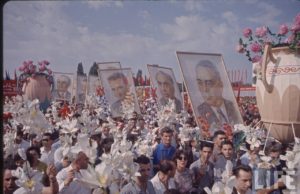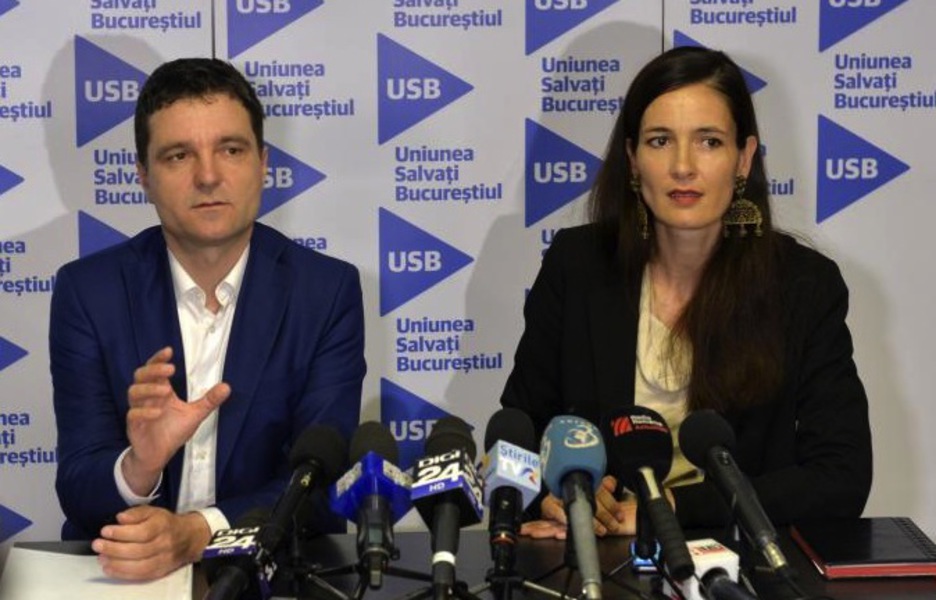As the Romanian parliamentary elections draw near, political commentators hired by news stations as semi-permanent guests, rejuvenated by the newly-discovered self-importance, gather around the “new kid” on the block – Uniunea Salvati Romania or USR – in order to throw stones or cast opinions. What was once a party of Bucharest’s civil society now strides to become a congress party – a union in itself, reuniting other local initiative groups that have sprung up in the last local elections.
The most ardent debate has probably revolved around the party’s ideology or lack thereof, with one camp voicing its mistrust of a new party that refuses adhere to the conventional left-right dichotomy and the other arguing for a new, policy-oriented way of doing politics. However the fact remains that ideology, originally referring to the “science of ideas” as put forth by Antoine Destutt de Tracy, Napoleon’s great disappointment, now free of its Marxist understanding which wrongly subsumed it it to the dominant class, has not carried much weight in post-communist Romania. Words like “social-democrat”, “liberal”, even “left” and “right” have only signified demarcations by which the electorate could distinguish one candidate from another, often not even that, as politicians switched radically different parties and ideologies on a monthly basis, rendering values and beliefs void of any meaning.
We have had a prime-minister that now claims to be liberalism incarnate, when all he did in office was to enlarge an already belated state apparatus and encourage people to live off credit. We have had a leftist prime-minister who claimed to champion the needs of the poor and oppressed while cutting taxes (even if creating new ones at the same time) and giving “electoral presents” to large segments of the electorate before the elections. Of course, at that time we could not know that by “poor and oppressed” he meant his own friends and associates. Meanwhile, interest groups behind each of these headpieces negotiated, competed and even merged in order to leech more off the back of the state. In the backdrop, populist anti-politics chants continued to accompany every round of elections in Romania since 1989, encouraging people to give up voting altogether because politicians “are all the same.”

Plainly put, Romania is a country filled by disappointment. Journalists have disappointed in being the gatekeepers of information they are meant to be, descending to the status or political lackeys. Doctors have disappointed in saving lives. Professors have disappointed at being the intellectual backbone of the nation. The administration, be it central or local, regularly disappoints at spending and organizing tax money. All branches of government have disappointed. But most of all, Romanian parties have disappointed. They have disappointed both as government and as opposition. The left has disappointed and the right has disappointed. This situation is however two-sided. First, no party, no leader figure and no democratic ideology could have satisfied the holistic and undemocratic expectations Romanians, as they narrowly escaped the grasps of their own brand of communism, had from their leaders.
Most of the adults now living, working and voting in Romania grew up in a time when the word “party” was spelled with a capital P. The Party was what in cosmogony is referred to as a “monad”, a Pythagorean term that described the first being, one of indivisible origin, the totality of all things and the source of everything. The Greeks believed that from the monad, a dyad was born, from it numbers; from numbers, points; then lines, two-dimensional entities, three-dimensional entities, bodies and the four elements which make up the world as we know it. Similarly, the Party was, in communism, a semi-deity, separate from any individuals that might compose or lead it at any time. It was the origin of all, parts or representations of its presence permeating every inch of society. The Party was glued to clothing, books, food, buildings, gestures, speech, habit, relationships and even thought. It constructed the world around it, a reality of its own. In comparison, the democratic parties of the present are fragile and powerless things, incapable of conducting reforms when in power and negligible when in opposition. They break up into smaller parties as a result of petty bickering, something that the Party would have never done. Most of all, they are corrupt to the core, peddling the trust that the electorate has given them for influence and material gain. Thus, to most adult Romanians, democratic parties seem grotesque parodies when compared to the capable, honest, all-doing and all-reaching Party.

Where does USR fit in all this? How can they gain a meaningful role on the Romanian political stage? From the viewpoint of public statements, the party led by Nicusor Dan and Clotilde Armand is for Romanian politics the equivalent of an anti-monadic element. It outright refuses to be the source of all things, refuses most of the people who apply as members, refuses to utter a clear-cut view on all things possible and finally it refuses to try to take executive power but merely to influence it in a few key areas. Due to this last point, they have no issue with expressing sympathy for the current technocratic government of Dacian Ciolos, whose ministers have to deal with PSD sabotage at every attempt to reform and organize a system that was never either of these things.
Here is where political science comes center stage through the writings of an economist named Anthony Downs. In his 1957 treatise An Economic Theory of Democracy, Downs argued that the ideological proximity between elector and candidate determines the preference of the elector and therefore the outcome of the election. Such was the importance Downs gave to this principle that he called it the “fundamental determinant of a nation’s politics”. His theory became a framework for future models which continued to build upon it, all within the school of Public Choice. Thus, while the Davis-Himich-Ordeshook model stressed the vital importance of the “median voter”, the perceptual model formulated by Himich and Pollard in 1981 identified the informative importance of the ideological “labels” – for example “liberal” or “conservative”. Through such a label, the elector could obtain all the information he needs regarding the candidate’s stance on a numerous issues without having to bear the usual heavy cost (the influence of economy in this theory is evident) of getting informed.
To these complicated and confusing theories and models put forth by men with names destined to author academic papers, Palfrey added his own model. He argued that when (and only when) a segment of voters is ideologically left “unattended to” by establishment-parties on either side of the political continuum, a new party may emerge. The majority of Romanian voters are far from being confidently enlisted as supporting on ideological grounds either PNL or PSD, the mainstream parties. Hence, there is room for USR, essentially an anti-system party.

However, other forces are thrown into play during the exhausting ideological balancing act required from a new party in order to enter Parliament. One of them is the psychological effect of the electoral system, a duvergerian concept that describes a situation in which “voters appreciate that the preferred party has no chances of winning, so they will abandon it and will go to a more viable choice, voting strategically”. On the flip side, in proportional electoral systems (even mixed member proportional systems like Romania) voters may strategically abandon the most powerful party due to the fact that their additional votes would not translate into additional mandates. Thus, they will vote their “secondhand option”, a party which could use the additional votes in order to reach the electoral benchmark and make it to parliament. Sound familiar yet? Due to the fact that USR, essentially a city-based party, and PNL share much, if not most of their electorate (middle to upper middle class, urban, young, private sector business owners and employees), either situation is possible. What remains is to be seen.
Sources
http://www.biziday.ro/2016/05/24/caciulile-cu-muste-ale-lui-tariceanu/
https://www.facebook.com/Cristian.Ghinea.Oficial/posts/1093308217428463
https://www.britannica.com/biography/Antoine-Louis-Claude-Comte-Destutt-de-Tracy
http://www.digi24.ro/Stiri/Digi24/Actualitate/Politica/Analiza+Digi24+Masurile+electorale+luate+de+guverne+inainte+de+a
http://www.hotnews.ro/stiri-esential-20212305-scurta-poveste-despre-implicarea-lui-victor-ponta-alaturi-dan-sova-laurentiu-ciurel-dosarele-turceni-rovinari.htm
http://www.mediafax.ro/politic/liderul-usr-nicusor-dan-dacian-ciolos-are-onestitatea-si-competenta-de-a-conduce-un-guvern-pe-care-sa-l-sustinem-dupa-alegeri-15542530
http://polisci2.ucsd.edu/foundation/documents/06Downs1957.pdf
Ungureanu, Mihai; Volacu, Alexandru; Roescu, Andra, Alegere rationala si comportament electoral, Tritonic, IPP, 2015, cap. 5-6
Photos












